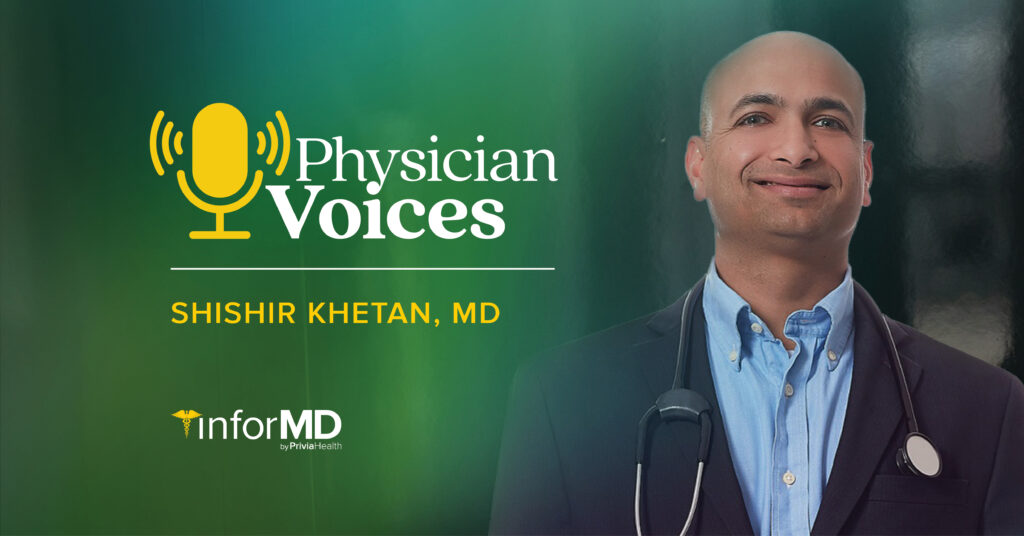Our “Physician Voices” series empowers doctors to share their unique stories, expert perspectives, and helpful insights. These candid conversations explore key topics, such as cultivating the doctor-patient relationship, operating an independent practice, navigating day-to-day challenges, and reimagining care delivery. By elevating the clinical voice, we aim to enable physicians to transform healthcare in the communities they serve.
What are the main challenges your specialty faces?
Burnout. There’s an ever-increasing demand on primary care providers to do more. Doing more includes seeing more patients as an increasing number of practices transition to concierge medicine. Doing more includes enhancing our ability to treat patients who, in this ever-changing COVID landscape, need high-quality, responsive care, both in person and via telehealth. Doing more includes checking more boxes in order to participate — and succeed — in value-based contracts.
How do you nurture and cultivate relationships with your patients?
The doctor-patient relationship is crucial. This relationship is built on mutual respect and empowering patients to own, control, and manage their health. Patients should understand their conditions and options while taking an active role in every step of decision-making. This engagement promotes greater buy-in and compliance, leading to better health outcomes.
How can technology nurture the doctor-patient relationship?
Technology allows for more touch points, engagement, and access. And there’s much more happening than telehealth. Remote patient monitoring works by giving patients a device that, for example, monitors their blood pressure and blood sugar between visits. That real-time data seamlessly syncs with their record so that, if needed, we can take any necessary action. Similarly, technology can enable us to see if a patient was admitted to the hospital. We can then reach out to them and schedule an appointment once they are discharged to help avoid readmission. These tools also help further value-based medicine by helping us treat the whole patient rather than just episodes of care.
What are your predictions for the future of medicine and healthcare, and how might the industry help you navigate and thrive moving forward?
I think we need provider-led task forces to look at our current technology and find ways to enhance the doctor-patient relationship while evaluating new tools, such as AI. Right now, AI’s applications in medicine are very fragmented. AI could help with interoperability for electronic health records, which hasn’t come to fruition. Every day, we spend hours retrieving and sharing patient information with other providers. AI capabilities could drastically cut that time, allowing our clinics to be reduced by one or more employees, which is especially important now given our nation’s workforce shortage.
What technology and support can help physicians transition to and succeed in value-based care?
Technology is essential to improving access for patients. Telehealth’s convenience saves patients’ time and allows for more compliance with visits. While patients will always need to see their physician in-person for certain appointments, the pandemic has proven that we can meet virtually for many visits, even for chronic care management. For instance, if you’re seeing a diabetic patient and modify their insulin regimen, telehealth enables us to easily see them a few weeks later to review their blood sugar levels and make adjustments to their regimen. This all goes back to the doctor-patient relationship. Whereas before, in-office appointments were the norm, now more patients are using portals and virtual visits, which are great tools to meet patients where they are and provide the care they need.
Shishir Khetan, MD, is a board-certified internist at Rockville Internal Medicine Group in Maryland, where he has practiced since 2004. Dr. Khetan has participated in clinical research, performed stress tests, and worked to utilize EHRs more efficiently. Outside of medicine, he loves playing basketball, watching movies with his kids, and enjoying a glass of fine wine.










Related Articles
How to Keep Your Patients From Skipping Mammograms
Kristin Schraa, MD, with Virginia Women’s Center shares how women’s health providers can encourage patients ...
3 Ways Healthcare Can Integrate Behavioral Health and Primary Care
Integrating behavioral health with primary care can lead to better patient outcomes — but how ...
How Can Physicians Support Postpartum Mental Health?
On average, 13 percent of mothers in the United States will develop symptoms of postpartum ...
Engaging Patients in Annual Mammograms
Studies show that a little over 66 percent of women aged 40 and older get ...
What Do Medicare-Aged Patients Want in Their Healthcare?
Within the next 20 years, 20 percent of Americans will be 65 or older. It ...
How Health Systems Grow Stronger With Privia Health
Discover how we helped Health First upgrade technology, align physicians, and accelerate toward value-based care. ...